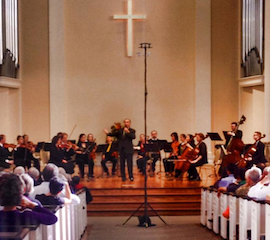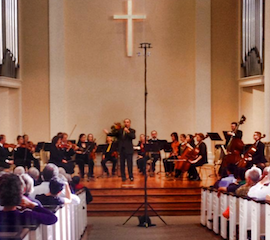
What’s with conductors turning concerts into a Music Appreciation 101 class? Before each of the five short pieces on the San Francisco Chamber Orchestra’s “Dances and Airs” program Saturday, Benjamin Simon talked about the music and had the orchestra play some excerpts. I don’t mind when musicians share some verbal excitement with audience for a few minutes, or even give an in-depth talk an hour before the concert. But when they give away the magic of the music right before performing it by spoon-feeding every idea beforehand, it just gets in the way. I know I also have been guilty of this in my concerts (and my reviews); it’s easy to babble on and on about music you feel passionately about.
Some of Simon’s observations were illuminating, such as describing a particular Handel motif as laughter or comparing Aaron Jay Kernis to Samuel Barber. But this isn’t baseball; we don’t need a play-by-play. All the music on the program was good enough to stand on its own without introduction. Let the music speak for itself. The first introduction was 10 minutes long and others were about five minutes — way too long.
When the music finally arrived, it was excellent. The Handel Concerto Grosso in A Minor was expressive and elegant without being overly romantic. Robin Sharp, Debra Fong, and Hannah Addario-Berry all played with big, beautiful sounds that rang clear as soloists and also blended seamlessly with the orchestra.
Kernis’ Musica Celestis is a dreamy reverie with chords dissolving into each other like clouds, then dissipating into nothingness. Usually, composers write for harmonies to change in blocks, but hearing the spine-tingling dissonances creep in and out made for a tantalizing effect. These calm sonic clouds eventually coalesced into a storm featuring some dizzying fast runs, deftly dispatched by the string players.
Kernis’ Musica Celestis is a dreamy reverie with chords dissolving into each other like clouds, then dissipating into nothingness … Hearing the spine-tingling dissonances creep in and out made for a tantalizing effect.
Marimbas were featured in an Astor Piazzolla tango and in Laurie San Martin’s new orchestration of layover/overlay. The percussion duo Mayumi Hama and Christopher Froh are a perfect fit with each other. They both perform with lots of playfulness and poised energy. The marimba is one of the most melodic of the percussion instruments; the pair was able to create singing lines with the percussive clicking of their mallets.
In layover/overlay, a confusing orchestral accompaniment rambled on behind the marimba soloists as they banged and rumbled in intense, yet blurred, sonorities. The two parties seemed to be playing unrelated pieces, and San Martin practically admits as much in her program note. The disjointed effect was baffling, almost maddening. The orchestra would play long, smooth melodic lines searching in the background while the marimbas produced high-octane noise. Unlike a traditional concerto, orchestra-versus-soloists seemed to be working against each other rather than supporting or responding to the other. Of course, sometimes life is like that — and it made for an interesting tension. Simon’s dedication to new music is admirable; many SFCO concerts feature living composers, often local.
Inspired by Simon’s cheerful leadership, the entire orchestra plays with a fun, youthful energy that’s not always found among traveling professional ensembles.
Closing the concert was Respighi’s Ancient Airs and Dances. The strings were again featured with another Italian-style collection (as in the Handel). This time, it was decidedly on the overly Romantic schmaltzy side, with soupy, late 19th-century melodies disguised as Baroque dances. The cello pizzicato accompaniments sounded warm and gentle, while the plaintive viola section solo was delivered with understated grace. Inspired by Simon’s cheerful leadership, the entire orchestra plays with a fun, youthful energy that’s not always found among traveling professional ensembles.
The SFCO’s concerts are all free of charge — they should be packing concert halls and churches every time. On Saturday night, competing with the World Series, Palo Alto’s First United Methodist was about half full. SFCO’s New Year’s Concerts regularly play to full houses, though, and this year’s celebration will feature local wunderkind and Menuhin Competition winner Stephen Waarts. Arrive early if you want to get in — better yet, become a member for guaranteed seats.

